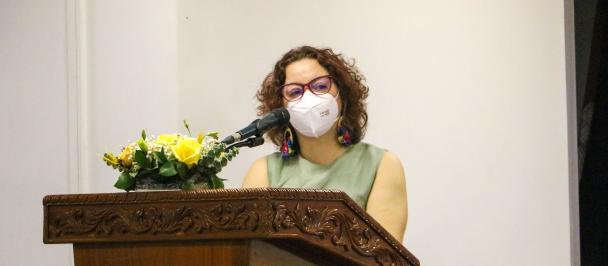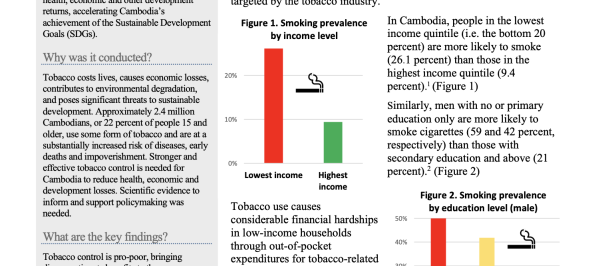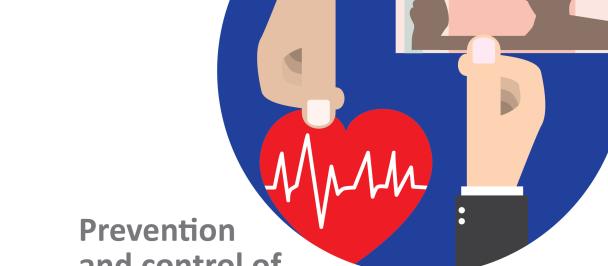Phnom Penh, Cambodia, 04 July 2019 – Tobacco-related illnesses cost the Cambodian economy KHR 2.7 trillion (approximately USD 657.1 million) every year, equivalent to 3.0% of the country’s Gross Domestic Product. These costs are due to health care expenditures and ‘hidden’ productivity losses from premature mortality, disabilities and smoking breaks.
The 15,000 lives lost to tobacco use is just one part of a much bigger problem. A new study was launched today that looks at the health and economic costs of tobacco use in Cambodia.
The findings of the Cambodia FCTC Investment Case, were presented to the Government of Cambodia in Phnom Penh this week by a United Nations-led international team comprised of the Secretariat of the WHO Framework Convention on Tobacco Control (FCTC), the United Nations Development Programme (UNDP), the World Health Organization (WHO), and RTI International. The study was conducted in partnership with the Ministry of Health and the Ministry of Economy and Finance.
Other than the health and economic costs of tobacco use, the study also estimates the potential health and economic gains from scaled up implementation of evidence-based tobacco control measures. Scaling up tobacco control measures will save 57,000 Cambodian lives and avert KHR 7.9 trillion (USD 1.9 billion) in health costs and economic losses by 2033. This translates into 3,815 lives saved annually. The return on investment is also significant where for every riel invested in tobacco control today, Cambodia will receive KHR 178 in economic returns by 2033.
“The investment case study clearly shows that tobacco is harming our people and our economy.” says His Excellency Dr Oeurn Borarorth, Secretary of State for Health. “The Government is committed to implementing the necessary measures to better the health of all, save lives and improve the economic well-being of the country and the people.”
As a Party to the world’s tobacco control international treaty – the World Health Organization Framework Convention on Tobacco Control (WHO FCTC), Cambodia has taken important steps to reduce tobacco use. These steps include the enactment of a comprehensive tobacco control law, establishment of a national multisectoral coordinating mechanism and implementation of large pictorial health warnings on cigarette packages.
“While we have seen Cambodia make great strides in tobacco control, more can still be done to protect the people from the harms of tobacco. We encourage all government ministries in Cambodia to support the full implementation of the WHO FCTC to advance health and sustainable development” said Rodrigo Santos Feijo, Technical Officer, Development Assistance with the WHO FCTC Secretariat.
The investment case reveals that, although strengthening tobacco control would benefit all, Cambodia’s lowest income group would benefit most. Under the first year of the described tax increase, around 46 percent of the deaths averted from the recommended tax increase on cigarettes would be among Cambodia’s lowest income quintile. Further, this would avert 1,499 cases of impoverishment due to out-of-pocket spending on tobacco-attributable diseases and 16,823 catastrophic health expenditures. This is because poorer populations would quit or reduce smoking at higher rates than wealthier populations due to higher taxes. Without these expenses, households can now direct resources to nutrition, children’s education and other productive investments.
“One thing I took away from the investment case is how effective tobacco control is at protecting the lives and livelihoods of lower-income Cambodians,” says Richard Colin Marshall, Senior Economist, UNDP Cambodia. “This underscores how critical the WHO FCTC is for achieving a range of Sustainable Development Goals, including SDG 10 on reducing inequalities.”
The investment case marks an important milestone for Cambodia. “The study saw strong collaborations beyond the health sector,” said Nargiza Khodjaeva, Acting WHO Representative, Technical Lead, Noncommunicable Diseases and Health through the Life-Course, WHO Cambodia. “The findings will contribute to the global and regional agenda on prevention of noncommunicable disease risk factors and would be key to informing policies for public health, economic growth and sustainable development.”
The investment case was conducted as part of the FCTC 2030 project, generously funded by the Governments of the United Kingdom and Australia.
*****
For media inquiries, please contact Samruol IM, Communications Analyst, at samruol.im@undp.org.

 Locations
Locations



